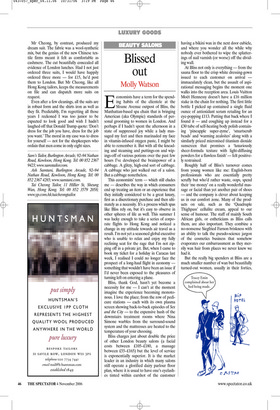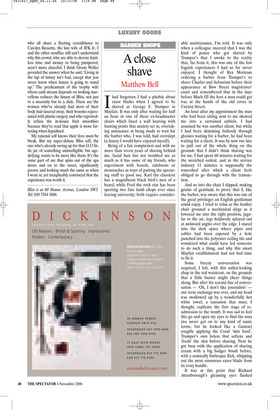Blissed out
Molly Watson
Economists have a term for the spending habits of the clientele at the Sloane Avenue outpost of Bliss, the Manhattan-based spa chain that is bringing American (aka Olympic) standards of personal grooming to women in London. And perhaps if I hadn’t spent the afternoon in a state of suppressed joy while a lady massaged my feet and then marinaded my face in vitamin-infused oxygen paste, I might be able to remember it. But with all the kneading and steaming and puttings-on and wipings-off of various potions over the past few hours I’ve developed the brainpower of a cabbage. A glitzy, high-end sort of cabbage. A cabbage who just walked out of a salon. But a cabbage nonetheless.
This economists’ term — which still eludes me — describes the way in which consumers end up treating an item or an experience that they initially considered to be a great luxury, first as a discretionary purchase and then ultimately as a necessity. It’s a process which spas like Bliss rely on, but it’s easy to observe in other spheres of life as well. This summer I was lucky enough to take a series of corporate flights to Hong Kong and noticed a change in my attitude towards air travel as a result. I’m not yet a seasoned global executive who is unable to relax and enjoy my fully reclining seat for the rage that I’m not zipping off in a private jet. But, when I came to book my ticket for a holiday in Caracas last week, I realised I could no longer face the prospect of a long-haul flight in economy something that wouldn’t have been an issue if I’d never been exposed to the pleasures of turning left on entering a plane.
Bliss, thank God, hasn’t yet become a necessity for me — I can’t at the moment imagine the experience becoming monotonous. I love the place; from the row of pedicure stations — each with its own plasma screen showing back-to-back episodes of Sex and the City — to the expensive hush of the downstairs treatment rooms where Nina Simone warbles from the surround-sound system and the mattresses are heated to the temperature of your choosing.
Bliss charges just about double the price of other London beauty salons (a facial costs between £105–£180, a massage between £55–£165) but the level of service is exponentially superior. It is the market leader in an industry in which many salons still operate a glorified dairy parlour floor plan, where it is usual to have one’s eyelashes tinted within earshot of the customer having a bikini wax in the next door cubicle, and where you wonder all the while why nobody ever bothered to wipe the splatterings of nail varnish (or worse) off the dividing wall.
At Bliss not only is everything — from the sauna floor to the crisp white dressing-gown issued to each customer on arrival immaculately clean, but the assault of aspirational messaging begins the moment one walks into the reception area. Louis Vuitton Moët Hennessy doesn’t have a £16 million stake in the chain for nothing. The first little bottle I picked up contained a single fluid ounce of antioxidant serum retailing for an eye-popping £113. Putting that back where I found it — and coughing up instead for a £30 tube of self-heating body polish containing ‘pineapple super-zyme’, ‘smartscrub beads’ and ‘warming zealoites’ along with a similarly priced micronised titanium dioxide sunscreen that promises a ‘luxuriously sheer-formula texture with light-diffusing powders for a flawless finish’ — felt positively restrained.
Roughly half of Bliss’s turnover comes from young women like me: English-born professionals who are essentially pretty scruffy but who’d rather waste, oops, spend their ‘me money’ on a really wonderful massage or facial than yet another pair of shoes — and the company is clever about keeping us in our comfort zone. Many of the products on sale, such as the ‘Quadruple Thighpass’ cellulite cream, appeal to our sense of humour. The staff of mainly South African girls, or estheticians as Bliss calls them, are also important. They combine a no-nonsense Siegfried Farnon briskness with an ability to talk the pseudo-science jargon of the cosmetics business that somehow evaporates our embarrassment as they merrily wax hair from places we never knew we had it.
But the really big spenders at Bliss are a much smaller number of wan but beautifully turned-out women, usually in their forties, who all share a fleeting resemblance to Carolyn Bessette, the late wife of JFK Jr. I and the other scruffies still can’t understand why this crowd, who are able to devote limitless time and money to being pampered, aren’t more cheerful. I think Orson Welles provided the answer when he said, ‘Living in the lap of luxury isn’t bad, except that you never know when luxury is going to stand up.’ The predicament of the trophy wife whose cash stream depends on looking marvellous reduces the luxury of Bliss, not just to a necessity but to a duty. These are the women who’ve already had most of their body hair lasered away, their bosoms rejuvenated with plastic surgery and who reportedly refuse the in-house fruit smoothies because they’ve read that apple is more fattening when liquidised.
My rational self knows their lives must be bleak. But my super-deluxe Bliss self, the one who’s already saving up for that £113 little jar of something unintelligible but agedefying, wants to be more like them. It’s the same part of me that spins out of the spa doors and on to the street, significantly poorer and looking much the same as when I went in, yet inexplicably convinced that the experience was worth it.
Bliss is at 60 Sloane Avenue, London SW3. Tel: 020 7584 3888.



















































































































 Previous page
Previous page